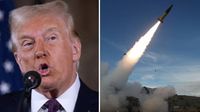On April 4, 2025, President Donald Trump issued a bold proclamation regarding the Houthi rebels in Yemen, asserting that they would not succeed in sinking U.S. ships again. This statement came alongside a 23-second video he shared on his social media platform, Truth Social, which depicted an airstrike against the Houthis, a group Trump claimed was planning an attack on American naval vessels.
In his post, Trump stated, "These Houthis gathered for instructions on an attack. Oops, there will be no attack by these Houthis! They will never sink our ships again!" His comments echoed the administration's ongoing military response to Houthi actions in the Red Sea, which have raised significant concerns about maritime security.
Just three days prior, the Houthis had announced they had targeted the U.S. aircraft carrier Harry S. Truman and other vessels in the Red Sea. This assertion came amidst a backdrop of heightened tensions following a series of Houthi attacks. The insurgency's recent escalation was reportedly in retaliation against U.S. support for Israel during its offensive in Gaza, which resumed on March 18, 2025, violating a ceasefire established earlier in the year.
The video shared by Trump shows a group of individuals gathered in a dispersed oval formation, seemingly receiving instructions before a bomb is dropped, resulting in a significant explosion and a large crater. The footage, captured from a military drone, was presented in black and white, and Trump’s accompanying message included a sarcastic "Oops," emphasizing his derision towards the Houthi threat.
In the wake of these events, the Trump administration has intensified its military operations in Yemen, conducting airstrikes aimed at diminishing the capabilities of the Houthi rebels. These actions are part of a broader strategy to counteract the group's maritime assaults, which have been described as a direct threat to international shipping routes.
As part of this military buildup, the U.S. government has announced the deployment of a second aircraft carrier, the USS Carl Vinson, to the region. This move underscores the seriousness with which the U.S. is treating the ongoing Houthi threats and the broader implications for stability in the Middle East.
The Houthis, officially known as Ansar Allah, emerged in Yemen during the 1990s and have been involved in a prolonged conflict with the Yemeni government. Their rise to prominence began with the control of the capital, Sana'a, in 2014. The group has since been engaged in a fierce struggle against a Saudi-led coalition that intervened in 2015 to restore the internationally recognized government.
The conflict has led to a humanitarian crisis, with hundreds of thousands of deaths and millions displaced. The Houthis have claimed their actions are not only defensive but also supportive of the Palestinian cause amid the ongoing conflict in Gaza.
Trump's recent remarks and the accompanying video reflect a significant shift in U.S. military posture in the region, as the administration seeks to project strength against perceived threats from the Houthis. By sharing the video, Trump aims to reinforce his image as a strong leader who takes decisive action against adversaries.
Critics of the administration's military strategy argue that such bombings may exacerbate the humanitarian situation in Yemen, where civilians have already suffered immensely due to the ongoing war. They contend that a more diplomatic approach is necessary to resolve the conflict and address the root causes of Houthi aggression.
However, supporters of Trump's approach believe that a robust military response is essential to safeguarding U.S. interests and ensuring the safety of maritime trade routes in the Red Sea. They argue that the Houthis' continued attacks on shipping vessels pose a significant risk to global commerce.
As tensions escalate, the international community is closely monitoring the situation. The potential for further military engagement raises questions about the long-term implications for U.S. foreign policy in the Middle East and its relationships with regional allies.
In summary, the situation in Yemen remains volatile, with the U.S. continuing its military operations against the Houthis in response to their threats. As Trump emphasizes a strong military stance, the complexities of the conflict highlight the challenges of achieving peace in a region fraught with historical grievances and ongoing violence.







